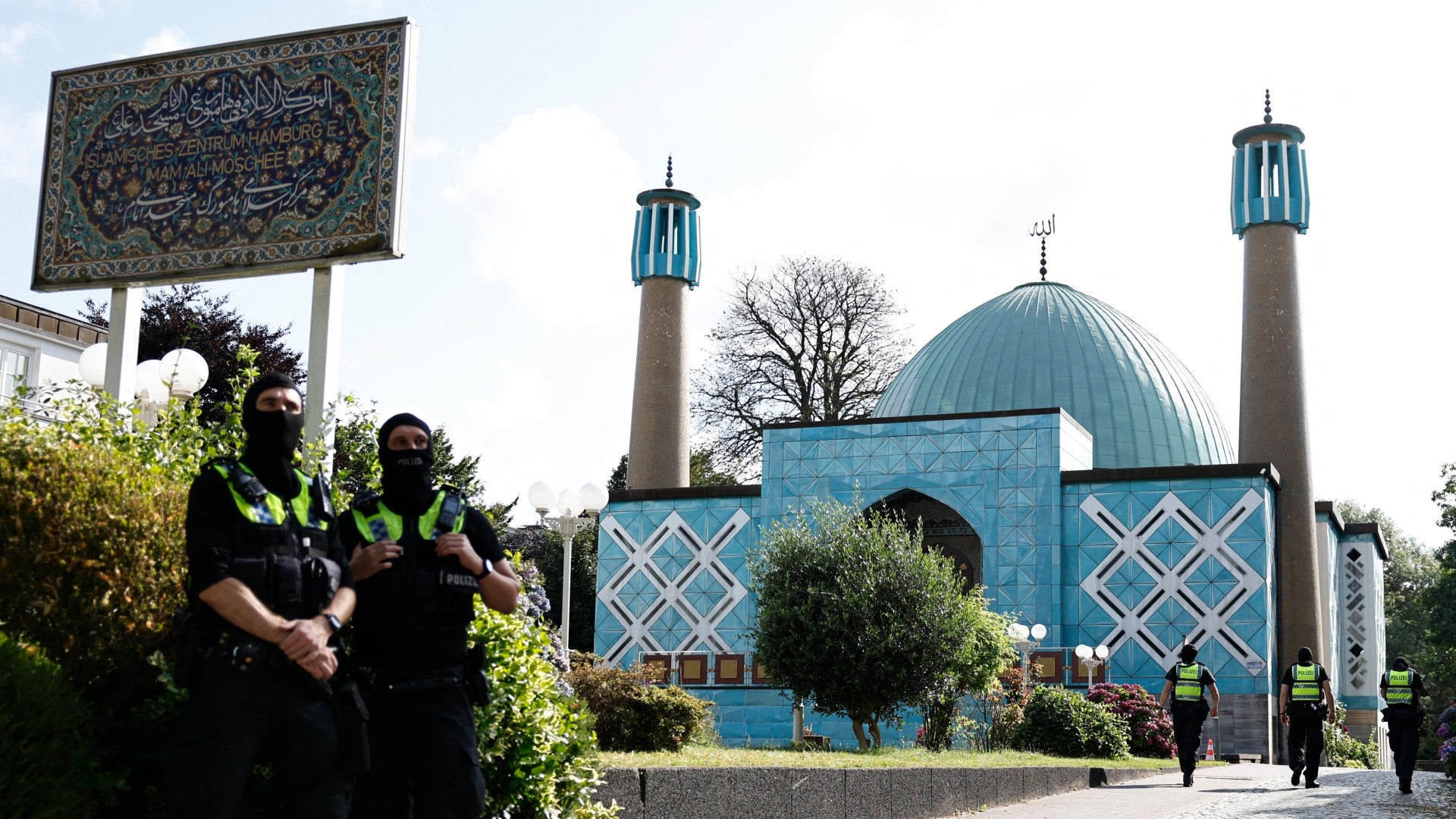Germany's Islamic Centre Hamburg shut down, called a 'front for Iran'

Germany's Interior Minister Nancy Faeser has closed down the Islamic Centre Hamburg, along with its "Blue Mosque", accusing it of propagating extremism and being "a front" for the Iranian government.
On Wednesday morning, hundreds of armed state policemen stormed Hamburg's Imam-Ali-Mosque, commonly referred to as "Blue Mosque" due to its turquoise facade, which is run by the Islamic Centre Hamburg (IZH).
Fifty-three institutions and mosques in five different states across Germany with alleged ties to the centre were also subject to raids. In addition to the centre in Hamburg, authorities banned nationwide subsidiaries in Frankfurt, Munich and Berlin.
In a video address published on X, Feaser accuses the association of pursuing goals that are anti-constitutional and praises the move as a step towards combatting "Islamist extremism". She accused the association of having close ties with Iran's leadership as well as Lebanon's Hezbollah.
According to a press release published Wednesday morning by the Ministry of the Interior, the raids began in November 2023, when state police confiscated material for evaluation from 55 institutions across Germany, allegedly securing "extensive evidence" in the form of documents, computers, mobile phones, and large sums of cash.
New MEE newsletter: Jerusalem Dispatch
Sign up to get the latest insights and analysis on Israel-Palestine, alongside Turkey Unpacked and other MEE newsletters
Before the raids in November 2023, IZH had said it “condemns every form of violence and extremism and has always advocated peace, tolerance and interreligious dialogue”.
During the raid on Wednesday, state police said they confiscated material and money, which will reportedly fall into the possession of the federal state.
"Today, we banned the Islamisches Zentrum Hamburg, which promotes an Islamist-extremist, totalitarian ideology in Germany. This Islamist ideology is opposed to human dignity, women’s rights, an independent judiciary and our democratic government", the press release reads.
In the statement, Faeser also claims that the Islamic Centre and its "sub-organisations" are spreading "aggressive antisemitism".
In response to the centre's closure, Iran summoned Germany's ambassador to Iran, Hans-Udo Muzel.
Majid Nili Ahmadabadi, the foreign ministry’s director for western European nations, said the ban was “a hostile act” which contradicts “basic principles of human rights".
'Direct representative' of Iran
The Islamic Centre Hamburg was founded in 1965 by Ayatollah Mohammad Beheshti, an Islamic scholar and confidant of Ayatollah Ruhollah Khomeini.
German news outlet Der Spiegel reported that "the IZH advertised itself as a 'meeting point for groups of different nationalities and religions' and as a place 'for meetings, communal prayer, lectures, seminars, readings, Islamic festivals, weddings, funerals and exhibitions as stated in an IZH brochure".
Germany's Federal Office for the Protection of the Constitution describes the centre as "an important Iranian propaganda centre in Europe".
Its current leader, Mohammad Hadi Mofatteh, was personally appointed by Iran's Supreme Leader, Ali Khamenei, and reports to him, Der Spiegel said.
Several years ago, while Mofatteh was travelling from Teheran to Hamburg, federal police officers said they discovered several notebooks and documents, which reportedly referred to Mofatteh as "Representative of the Supreme Leader, Head of the Islamic Centre Hamburg", German state media outlet Tagesschau reported.
The Federal Intelligence Service (BND) said in official testimony that Mofatteh himself is said to have served in the Iranian Revolutionary Guard Corps in the early 1990s.
Wednesday's press release by the interior ministry says that "as the direct representative of Iran’s Supreme Leader of the Islamic Revolution”, the IZH disseminates the ideology of the Islamic Revolution in an aggressive and militant way and "seeks to bring about such a revolution in the Federal Republic of Germany."
In her video statement, Faeser also said, "It is very important to make a clear distinction: we are not acting against a religion. The peaceful practice of Shiite faith and religion is expressly not affected by the ban."
German-Iranian politician and co-leader of Germany's Green Party Omid Nouripour welcomed the decision with a post on X, saying that "the Iranian regime has finally lost one of its central nests of espionage in Germany".
Online, criticism emerged that Faeser did not provide any supporting evidence in her decision to shut down the centre and the mosque, accusing her of "executive decisionism". Others have said that a court ruling should have been implemented to reach a decision.
Last November, Faeser said that Germany had a problem with Islamophobia and pledged stronger measures to combat it, as threats and hate crimes against Muslims have spiked in recent months.
“For many Muslims in Germany, the threat of becoming victim of anti-Muslim attack has become an everyday reality. This has a catastrophic impact on people's sense of security, we cannot accept this,” the Social Democrat politician said.
Hamburg's Blue Mosque is one of Germany's oldest and most well-known mosques and the building with the two minarets - protected as a historic monument - is a frequent sightseeing spot for tourists.
When the ban becomes final, the listed building will reportedly become federal property, according to reports by German media. The Hamburg Senate and the federal government will then determine what should become of the property. In the meantime, security forces have been deployed to protect the Blue Mosque from vandalism.
Middle East Eye delivers independent and unrivalled coverage and analysis of the Middle East, North Africa and beyond. To learn more about republishing this content and the associated fees, please fill out this form. More about MEE can be found here.

